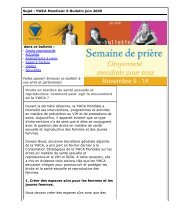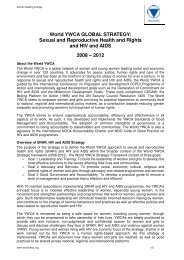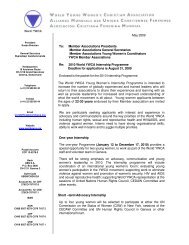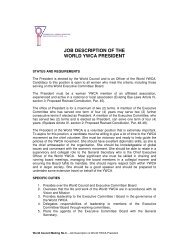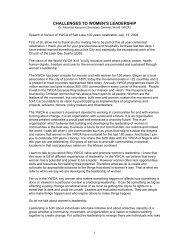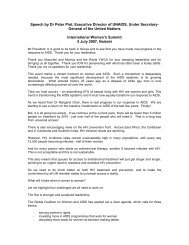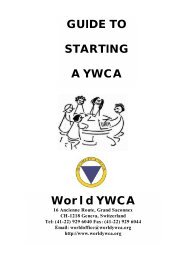If I kept it to myself - World YWCA
If I kept it to myself - World YWCA
If I kept it to myself - World YWCA
You also want an ePaper? Increase the reach of your titles
YUMPU automatically turns print PDFs into web optimized ePapers that Google loves.
<strong>If</strong> I <strong>kept</strong> <strong>it</strong> <strong>to</strong> <strong>myself</strong><br />
interview will be held<br />
• <strong>If</strong> you are going <strong>to</strong> be on television, wear clothing that is simple, w<strong>it</strong>hout<br />
large patterns, so that <strong>it</strong> is not distracting<br />
• Think ahead about whether you would like <strong>to</strong> be pho<strong>to</strong>graphed and if you<br />
are not comfortable w<strong>it</strong>h this, don’t let anyone pressure you<br />
• Try and obtain information of what kind of questions they will ask so that<br />
you can prepare<br />
• Use the KISS strategy. Keep <strong>it</strong> Straight and Simple<br />
• <strong>If</strong> there is a question that you do not want <strong>to</strong> answer don’t feel pressured<br />
• Always remember you can s<strong>to</strong>p an interview any time you want.<br />
Answering techniques<br />
• Be brief<br />
• Answer all questions directly relating <strong>to</strong> the question<br />
• Use words that come naturally <strong>to</strong> you<br />
• Try not <strong>to</strong> use acronyms, as people might not know what you are talking<br />
about, but if you do, make sure <strong>to</strong> explain them<br />
• Avoid Yes or No answers, always expand your answers so that <strong>it</strong> becomes<br />
a conversation.<br />
Journalists might ask you questions that are<br />
• Factual – who, what, where, why, when and how<br />
• Explana<strong>to</strong>ry – In what way....<br />
• Justifying – What do you think....<br />
• Leading – Should we consider...<br />
• Hypothetical – Suppose we did <strong>it</strong> this way...<br />
• Alternative – This is intended <strong>to</strong> make a decision – should we do this....<br />
• Coordinating - Paving the way forward, can we conclude that this would be<br />
the way forward...<br />
Add<strong>it</strong>ional things <strong>to</strong> remember in an interview and/or<br />
presentation<br />
• Be aware of using ‘them and us’ language, when referring <strong>to</strong> HIV pos<strong>it</strong>ive<br />
and negative people<br />
• Remember a boring speaker can make a two minute speech seem <strong>to</strong>o<br />
long but an interesting speaker can make a five hour long speech seem <strong>to</strong>o<br />
short!<br />
• <strong>If</strong> you are standing, stand up straight, don’t lean on a ledge<br />
• Use notes and don’t read your speech. Look up and connect w<strong>it</strong>h your<br />
audience<br />
• Maintain eye contact w<strong>it</strong>h everyone in the room and not just w<strong>it</strong>h one<br />
person<br />
• Only use humour if you have <strong>to</strong>, this applies <strong>to</strong> irony and sarcasm.<br />
78





